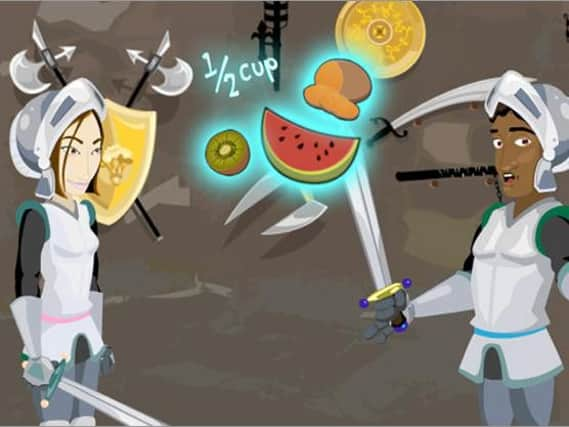Video games may help increase kids' fruit and veg intake


While playing computer games has long been linked with an unhealthy "couch potato" lifestyle, the new study seems to show that serious video games may help increase the fruit and vegetable intake of children.
Few children eat the recommended 'five a day' portions of fresh fruit and veg.
Advertisement
Hide AdAdvertisement
Hide AdBut eating adequate amounts is not only ideal for a healthy lifestyle, but has also been shown to reduce the risk of some chronic diseases including heart disease and certain cancers.
Using a serious video game, Squires Quest! II: Saving the Kingdom of Fivealot, researchers evaluated how creating specific plans within the goal-setting component in the game helped nine to 11-year-olds improve fruit and veg intake at specific meals.
For the study, 400 children played 10 episodes of Squires Quest! II, an online video game that promotes fruit and veg intake
All the children were asked to record whether they met their goals during the next episode in the game.
Advertisement
Hide AdAdvertisement
Hide AdParents were sent emails with a newsletter and link to a parent website which provided them with information on their child's weekly goals, suggestions for supporting achievement of fruit and veg goals, and ways to overcome common barriers to helping their family make healthy food choices.
To track the effect of the video game on real-life fruit and veg consumption at the outset and six months later, researchers completed 24-hour dietary recalls with children over the phone three times, averaging breakfast, lunch, snack, and dinner fruit and veg intakes.
The researchers noted improvements in both fruit and vegetable intake six months after the start of the experiment.
Study lead author Doctor Karen Cullen, of Baylor College of Medicine in the United States, said: "By using a serious video game, we saw increases in meal-specific vegetable intake at dinner for the children in the Action and Coping groups and fruit intake at breakfast, lunch, and snacks for all intervention groups."
Advertisement
Hide AdAdvertisement
Hide AdOf the 400 participants, 79 per cent reported meeting all goals during game play. Researchers attributed this partly to the game content, as serious video games are designed to both entertain and promote behavior change.
The researchers said getting parents involved with email and newsletters might also have played a role in the increase in fruit and veg intake among participants.
Dr Cullen said the work "showed promise" in increasing intake of fruits and veg among fourth and fifth grade students via serious video games, but more work must be done to ensure children are meeting their recommended intake